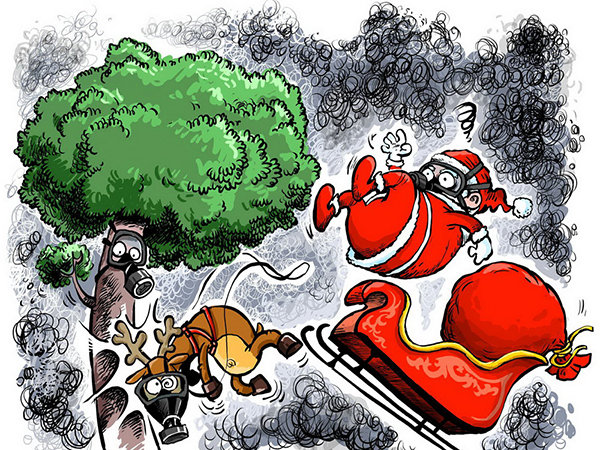|
 |
Heavy smog is bad for your health, but so far it has been good at stimulating a spontaneous revelry in making and partaking in wisecracks, channeling collective anxiety into temporary optimism.
Someone in Beijing says its smog is so dense he cannot see the Chairman Mao portrait at the Tian'anmen Rostrum. Another counters: "You call that dense? I cannot see the Chairman Mao image on my bank note."
Don't accuse me of believing in conspiracy theories, but I have a hunch that manufacturers of facial masks are behind this.
The longest distance in the world is not between life and death, but between you and me when I hold your hand in the street but cannot see your face.
These three paragraphs above are a sampling of the jokes that ordinary Chinese have created to make light of the smog that has been plaguing the country for the past few years, especially metropolises like Beijing. When the haze reduces visibility to such a low level, people's urge for gallows humor is tickled so relentlessly that a spigot of creativity is opened, and funny lines pour out and spill over onto the Internet.
If you think about it, the smog is a perfect conduit for a national carnival of such witticisms. Smog is not as instantly fatal as mine blasts or bridge collapses, which, tragic as they are, do not affect a wide swath of society. Nor is it as cathartic as a massive earthquake or other natural disasters, which usually give rise to a collective sense of nobility. It is chronic and widespread, and in a sense everyone is a perpetrator as well as a victim.

Some of the sarcasm comes from helplessness: You cannot relocate all manufacturing with pollution to remote places, and even if you do the pollutants may waft into your city anyway; you can ask others to drive less and use public transport, but when it comes to yourself most people still prefer the convenience of driving; and even if you stay home and cook your kitchen may add to the haze.
When experts said 13 percent of Beijing's PM2.5 originates from the restaurant business, people laughed it off as ludicrous-and then they did some tests. Suffice it to say, nobody can totally exonerate himself.
A funny thing happened when authorities asked the public to give a Chinese name to PM2.5, which is technical jargon for atmospheric particulate matter with diameter of 2.5 micrometers or less. It started as a serious exercise in search of a popular name and candidates such as "fine particles" or "particles that can get into the lung" were floated. Then came a bunch of terms that use homonyms to make fun, such as gong wu yuan, literally meaning "source of public haze" but sounding like "public servant", and jing chen, literally "Beijing dust" but a homonym for "city of Beijing".
